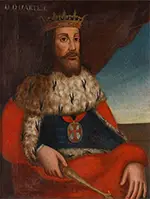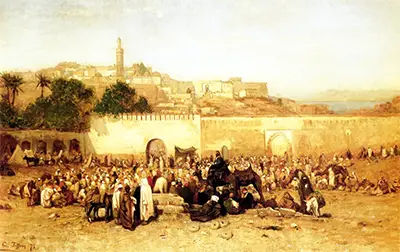King Edward of Portugal
Edward was King of Portugal for five short years in the 15th Century. He was known for his wisdom, for his commitment to the vision of his brother, the famous Prince Henry the Navigator, and for a military disaster in North Africa. Edward was born on Oct. 31, 1391, at Viseu, in Portugal. His birth name was Duarte. His father was the reining monarch, John I, and his mother was Philippa of Lancaster. 
As the oldest son of a king, Edward was the heir apparent to the throne, and he prepared appropriately. He undertook great learning and became an accomplished writer and poet. He was later known as Edward the Philosopher and Edward the Eloquent. He gained knighthood in 1415, in the same year that Portuguese forces seized the North African Moorish city of Ceuta. On Sept. 22, 1428, Edward married Eleanor of Aragon, who father was that kingdom's monarch, Ferdinand I. Edward and Eleanor had nine children, five of whom lived into adulthood: Afonso (1432), Ferdinand (1433), Eleanor (1434), Catherine (1436), and Joan (1439). Edward continued in his father's service until John (Joã0) died, on Aug. 14, 1433. On that day, Edward became king. The new king followed his father's policy of keeping the internal peace, going so far as to call the Cortes four times in order to assure himself that he and they understood one another. Edward also continued his father's policy of maritime expansion, greatly encouraging and expressly financing the voyages planned by his brother Henry. 
Although the Portuguese owned Ceuta, it wasn't exactly close to home and, because it was across the Strait of Gibraltar, required naval support and transport. Any hope of cutting in the thriving overland trade routes that crisscrossed the African continent began to fade when traders began to bypass Ceuta in favor of Tangier, along the coast to the west. After getting mixed views on whether to attack the city, Edward gave the go-ahead in 1437 and put his brother Henry in charge of the enterprise, which turned into a siege. The first assault was not successful; the second was not, either. In fact, no Portuguese attacks succeeded in taking Tangier. Quite the opposite occurred. A relief army encircled the Portuguese siege army and forced it to surrender. In exchange for the Moroccan army's pledge to let the Portuguese army go home, Henry agreed to give up the city of Ceuta, even sending his youngest brother, Ferdinand, to the Moroccan camp as a hostage until the city of Ceuta was once again in Moroccan hands. The Portuguese army did indeed return home unharmed. Henry, who had persuaded his brother the king to launch the attack in the first place, urged Edward to fight anew for Ceuta. Henry's brothers Peter and John urged their father to abide by the agreement struck with the Moroccan leader, so that their other brother could come home. Caught again between two opposing positions, Edward summoned the Cortes to advise him. They arrived in Leiria in early 1438 and, after deliberation, urged Edward to hold on to the city and to find some other way bring young Ferdinand home. Edward, still searching for a solution and also working on a major reform of his country's legal code, died, on Sept. 9, 1438, of the plague. His oldest son, Afonso, was all of 6 years old. A succession controversy ensued, as Edward had named his wife as Afonso's regent but the king's brother Peter also wanted to serve in that capacity. Peter eventually prevailed, ushering in the reign of King Afonso V. |
|
Social Studies for Kids
copyright 2002–2024
David White




